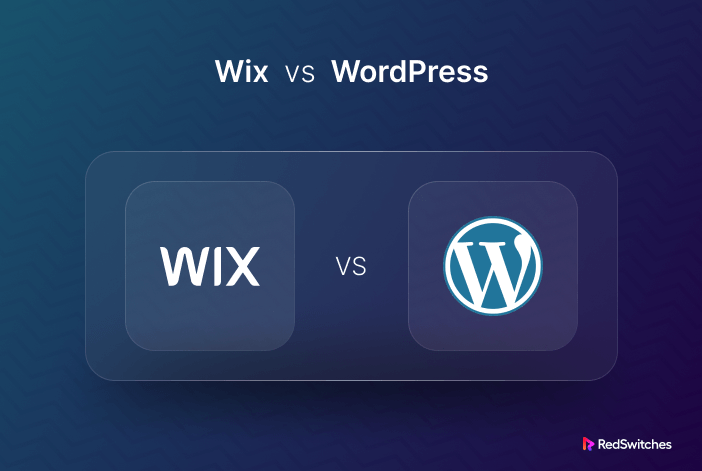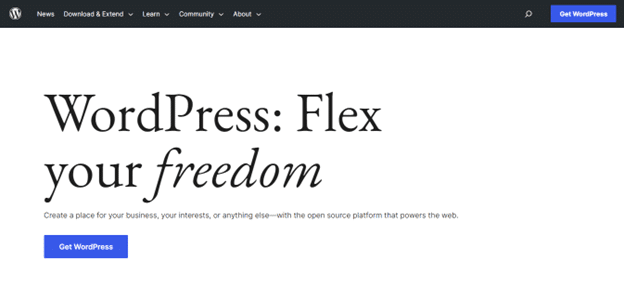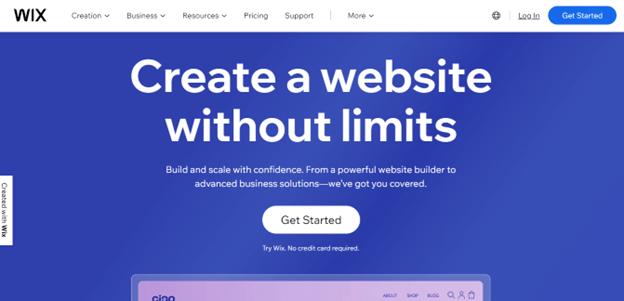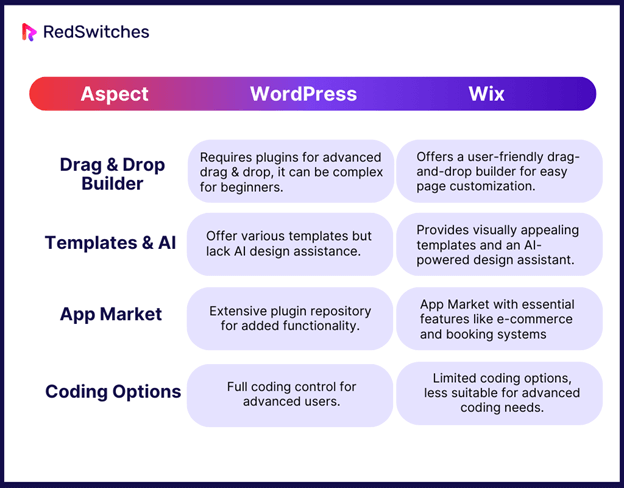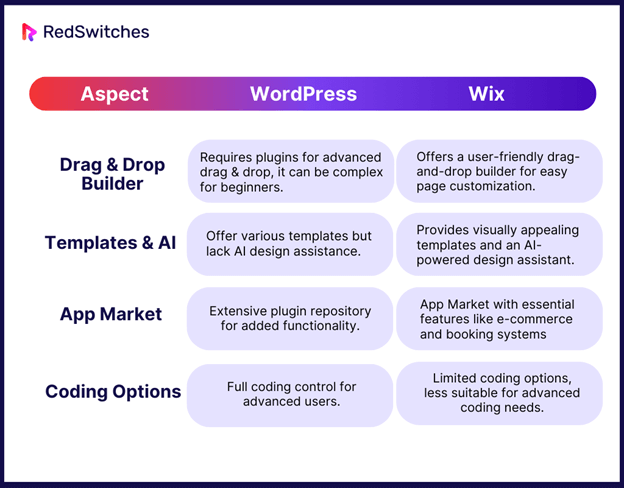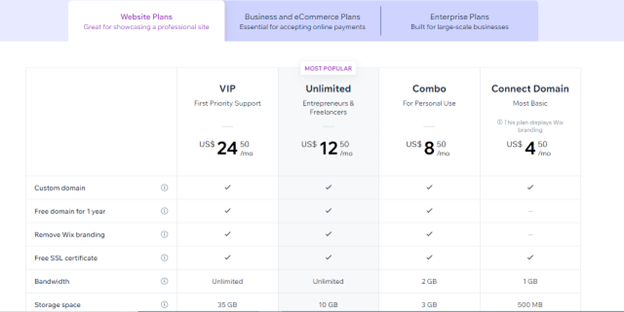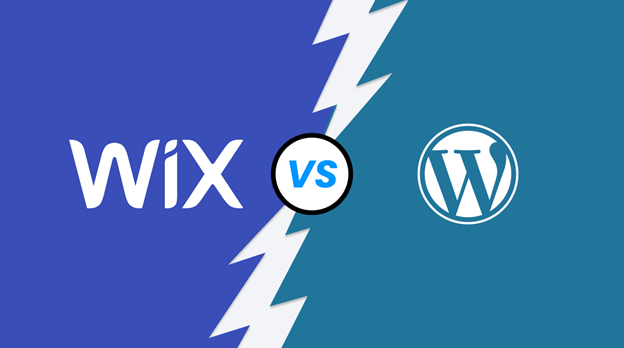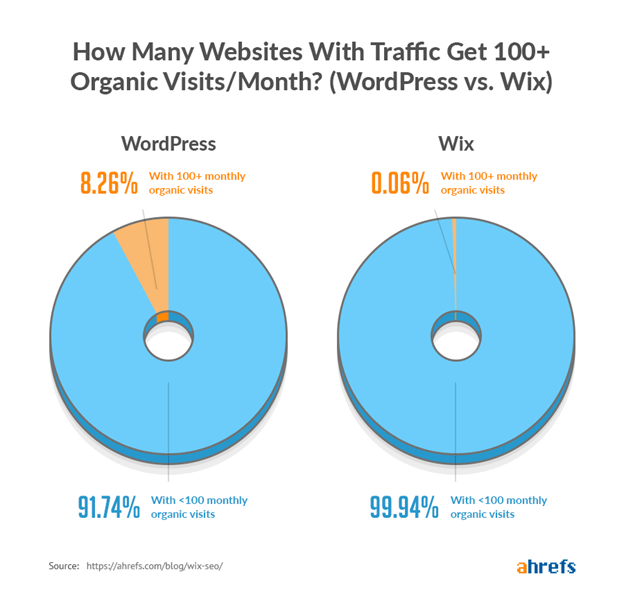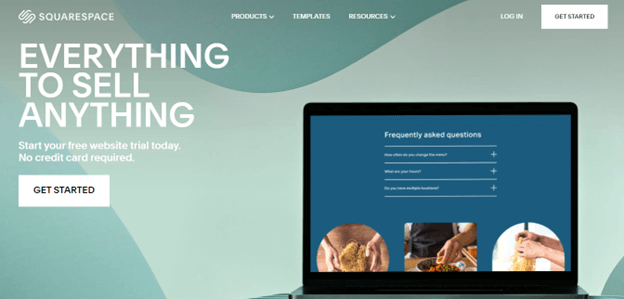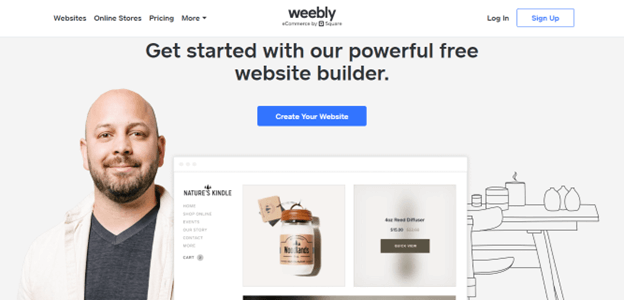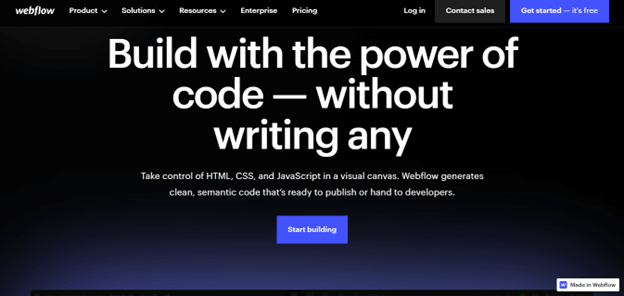In the digital landscape, website builders are becoming popular due to their ease of use and convenience of building a website. Statistics reveal approximately 10 million websites are built with website builders.
There are a few big names in the era of website builders if you want to create a website that’s easy to use and looks good. WordPress is the premier of them, with a 63.1% market share in 2023 due to its advanced customization options. On the other hand, Wix is ideal for beginners who want a platform that’s easier to use without any technical expertise.
So, which one serves as the best solution for your venture? In this blog, we offer an in-depth comparison of WordPress vs Wix, focusing on unique features, use cases, and benefits they offer.
Table of Content
- What is WordPress?
- What is Wix?
- WordPress vs Wix: Ease of Use
- WordPress vs Wix: Functionality Controls
- WordPress vs Wix: Page Builders
- WordPress vs Wix: Customization
- WordPress vs Wix: Plugins and Apps
- WordPress vs Wix: E-commerce
- WordPress vs Wix: Maintenance
- WordPress vs Wix: Pricing
- WordPress vs Wix: Limitations
- WordPress vs Wix: Which is Better?
- Are There Any Alternatives to WordPress and Wix?
- So, Which Is The Ultimate Winner?
- FAQs
What is WordPress?
Source: WordPress
WordPress is a popular and widely used content management system that allows users to create and manage websites and blogs. It is one of the most prominent and versatile platforms, with around 810 million websites made with WordPress, which equals 43% of the total websites available.
The target audience of WordPress is quite diverse, thanks to its flexibility and versatility. WordPress caters to a broad range of users, from individuals with no coding experience to organizations of various sizes aiming to create a professional website, each with unique goals.
Nonetheless, WordPress offers more customization options than its highest competitor, Wix. It allows full control over every aspect of your website, supported by different themes and plugins, which can be further tweaked with coding.
What is Wix?
Source: Wix
Wix is a cloud-based website-building platform that allows users to easily create websites and web applications, even if they have little to no coding or web development experience.
Founded in 2006, Wix has become one of the most popular website builders globally, known for its user-friendly drag-and-drop interface and a wide range of features.
With over 500+ built-in templates, Wix helps you build your website without having specialist skills or hiring a web developer. This makes it ideal for beginners and individuals who want to create a website quickly without technical knowledge.
2.5% of all websites are produced on Wix, which has the third-largest market share (3.7%) for content management systems. Although it is much less than WordPress, it is still the third most widely used website builder.
WordPress vs Wix: Ease of Use
Wix
As mentioned earlier, Wix has a beginner-friendly interface that makes it ideal for non-technical users who want a professional website. It also includes a free domain for one year and hosting.
The onboarding process is remarkably straightforward, even for individuals without web design experience. Wix guides you through a setup wizard as soon as you sign up, which helps you choose the type of website you want to create and your preferred design style.
The heart of Wix’s website creation process lies in the Wix Editor, a drag-and-drop builder that lets you assemble your website’s elements visually. You can easily add text, images, videos, and other elements by dragging them onto your page. The editor’s intuitive interface empowers users to make real-time website changes without coding skills.
WordPress
WordPress, on the other hand, offers a versatile platform but has a steep learning curve with an extensive setup process and a more complex dashboard (not really beginner-friendly). But why choose WordPress? Understanding your specific needs and goals is vital for a website builder. WordPress is an excellent choice for its flexibility, but consider factors like ease of use and customization.
To start, you’ll need web hosting and a domain name. Many hosting providers offer auto-installers that simplify the WordPress installation process, making it more accessible for beginners. However, this initial setup involves more technical steps than Wix’s seamless onboarding.
Though you don’t need to know all about coding, having the knowledge can get you the most out of WordPress’ customization options. Needless to say, you also need to know about web hosting over shared hosting to pick your provider before starting.
Once WordPress is installed, you’ll encounter the WordPress block editor, designed to make content creation more intuitive. While it may take some time to become familiar with, the block editor provides substantial flexibility for designing and structuring your content. WordPress’s strength lies in its ability to create complex and highly customized websites, which may require more effort to learn the platform.
WordPress vs Wix: Functionality Controls
WordPress and Wix provide users with various functionality controls regarding website management and customization, but they approach this aspect in distinct ways. Let’s delve into each platform’s key features and options:
WordPress: Unparalleled Flexibility and Control
WordPress is renowned for its unparalleled flexibility and control over website functionality. Here are some key aspects of its functionality controls:
Wix: Streamlined and User-Friendly
Wix, on the other hand, is designed with simplicity in mind, offering a more streamlined approach to functionality controls:
WordPress vs Wix: Page Builders
When it comes to building your website, the choice of a page builder can significantly influence your design experience and the final look of your site. WordPress and Wix offer page builders, Each with its own features and functionalities, catering to different user preferences and needs. In this comparison, we’ll delve into these page builders to help you understand how they can shape your web development journey.
WordPress
WordPress offers a variety of page builders, but one of the most popular is the Gutenberg block editor. Gutenberg has transformed the way content is created on WordPress websites. It employs a block-based system, where you can add and arrange content elements using a drag-and-drop interface. This approach simplifies the process, making it accessible to beginners while offering enough versatility for experienced users.
With Gutenberg, you can insert text, images, videos, widgets, and more as individual blocks. This modular structure enhances customization by allowing you to fine-tune each element independently. Additionally, the extensive library of Gutenberg-compatible plugins further extends its functionality, enabling e-commerce, SEO optimization, and more.
Wix
While Wix is renowned for its seamless and intuitive website builder, it offers an all-in-one solution, which means you can create and design your entire website within the Wix platform. The Wix page builder features a true drag-and-drop interface that enables users to add, arrange effortlessly, and style elements on their pages.
One of the key advantages of Wix is its WYSIWYG (What You See Is What You Get) editor, which allows you to preview your changes in real time as you edit your site. This immediate visual feedback appeals to those who prefer a more hands-on, visual approach to web design.
Key Differences
Level of Customization
While both platforms offer drag-and-drop interfaces, Wix’s platform offers a more streamlined and beginner-friendly experience. It simplifies customization, which can appeal to new website owners who want to get their sites up and running quickly.
Design Freedom
WordPress, with its block-based editor, provides more design freedom and fine-grained control. This makes it ideal for users who want to create highly customized websites or have specific design requirements.
Ecosystem
WordPress has a vast ecosystem of themes and plugins, offering extensive options for enhancing functionality and design.
Conversely, Wix provides an all-in-one solution, which may be more convenient for those who prefer an integrated approach.
WordPress vs Wix: Customization
Talking about customization, both WordPress and Wix offer a range of options to tailor your website to your specific needs. However, the methods and extent of customization differ between the two platforms.
Wix
Wix’s User-Friendly Approach: Wix shines in the realm of user-friendly customization. Its easy-to-use website builder empowers users to modify their site’s layout and content effortlessly. This intuitive approach is particularly appealing to those without technical backgrounds. Additionally, Wix incorporates an AI text creator, which can generate content for your website based on your input, streamlining the content creation process.
WordPress
WordPress boasts extensive customizability and flexibility. While it may have a steeper learning curve compared to Wix, it rewards users with unparalleled control over their website. WordPress offers a multitude of themes and the ability to modify them extensively using block-based editing, enabling you to create truly unique designs. Moreover, WordPress integrates seamlessly with third-party page builders, such as Elementor and Divi, allowing even more advanced customization options.
WordPress vs Wix: Plugins and Apps
In the realm of building a website, the availability of plugins and apps sounds essential, and it can significantly impact your site’s functionality and customization options. WordPress and Wix take divergent paths in providing these essential tools in the world of website builders.
WordPress
WordPress boasts a vibrant and extensive plugin ecosystem, setting it apart as a powerhouse for functionality customization. With around 60,000 plugins available in the WordPress Plugin Repository as of 2023, users have an unmatched variety of third-party extensions at their fingertips. These plugins cover many needs, from SEO optimization and e-commerce integration to social media sharing and membership management.
This diversity empowers WordPress users to tailor their websites precisely to their requirements. If you can dream it, there’s likely a plugin for it. The open-source nature of WordPress encourages developers worldwide to create and share plugins, fostering innovation and continually expanding the platform’s capabilities.
Wix
In contrast, Wix follows a different approach. It provides users with a robust selection of built-in features and tools that cover many common website needs. These integrated features encompass WordPress vs Wix for blogging, website design, e-commerce, and more, simplifying the website-building process for those who prefer an all-in-one solution.
In addition to its built-in features, Wix offers an app marketplace. While not as extensive as WordPress’s plugin library, the marketplace provides users with a curated selection of apps and integrations. These apps are designed to seamlessly integrate with Wix websites, offering additional functionalities like booking systems, social media feeds, and contact forms. This approach ensures compatibility and ease of use for Wix users.
WordPress vs Wix: E-commerce
Needless to say, choosing the right platform can significantly impact your business’s success when establishing an online business. WordPress and Wix are two popular choices for building e-commerce websites, each offering unique advantages and approaches to online selling.
Wix
Wix takes a straightforward approach to e-commerce. With Wix, adding e-commerce features to your website is as easy as a few clicks during the initial setup process. You can quickly set up product pages, add images, and define pricing with minimal effort. One of Wix’s standout features is its built-in inventory management, simplifying tracking product availability and sales.
The advantage of Wix’s e-commerce functionality lies in its user-friendliness and convenience. Small businesses and entrepreneurs looking for a hassle-free way to start selling online often find Wix a great fit.
WordPress
On the contrary, WordPress offers e-commerce capabilities through plugins like WooCommerce or Easy Digital Downloads. While this approach requires a bit more setup and configuration than Wix’s built-in features, it provides a broader range of customization options.
WordPress plugins like WooCommerce are highly customizable, allowing you to tailor your online store’s design, functionality, and payment gateways to your specifications. This flexibility makes WordPress an excellent choice for businesses with unique e-commerce requirements or expanding their online presence beyond simple product listings.
WordPress vs Wix: Maintenance
Both WordPress and Wix have their maintenance requirements, but they differ in terms of ease, technical skills required, and associated costs.
WordPress
For WordPress it regularly releases updates for its core software, themes, and plugins. Staying up-to-date is crucial for WordPress security issues, performance, and compatibility. Similarly, its website security is a significant concern. WordPress users need to implement security plugins and monitor for vulnerabilities. They must follow best practices to protect their sites from threats. You can also check our blog: 14 WordPress Security Issues You Don’t Have To Worry About Anymore. To prevent these security issues.
Moreover, regular backups are essential to safeguard your content. Know how to back up your WordPress site? Users often rely on plugins to automate backup processes.
Wix
Whereas, Wix handles software updates, ensuring that your website’s infrastructure remains current without any user intervention. It also has built-in security, incorporating security features like SSL certificates, firewall protection, and automatic malware scanning to safeguard your site.
Wix also automatically takes care of website backups, reducing the data loss risk.
Maintenance Ease
- While WordPress offers more control and flexibility, it requires more technical expertise to manage updates, security, and backups. Users may need to troubleshoot issues independently or seek assistance from developers.
- Wix excels in simplicity. Thanks to its user-friendly interface and automated processes, users without technical backgrounds can handle maintenance tasks effortlessly.
WordPress Cost vs Wix
- Maintenance costs for WordPress can vary. Some tasks can be handled for free, while others may require paid plugins or professional services. The total cost depends on your technical skills and the complexity of your site.
- Wix simplifies maintenance costs. Users can typically manage their sites without additional expenses, as most maintenance-related features are included in the platform’s subscription plans.
Regular maintenance is essential for both WordPress and Wix to ensure website performance and security. Neglecting updates, security measures, and backups can lead to vulnerabilities, performance issues, and potential data loss. Regardless of the platform you choose, understanding and prioritizing website maintenance is crucial to keep your online venture running smoothly and securely.
WordPress vs Wix: Pricing
In the battle of WordPress vs Wix. considering the pricing structure of both platforms against what they provide plays an important part in choosing the best website builder for you!
WordPress
WordPress offers a tiered pricing structure with four primary paid plans, each designed to accommodate various website requirements. However, many hosting service providers provide WordPress in their hosting plans, which are much cheaper than Wix.
Wix
Wix offers a wide range of premium plans, each designed to suit different types of users. It has Website plans for a professional website, Business and e-commerce plans for accepting online payments, and Enterprise plans for large-scale businesses. You can check the pricing range here: https://www.Wix.com/premium-purchase-plan/dynamo
Source: Wix Pricing
For enterprises and projects with high bandwidth requirements, a 10 Gbps dedicated server ensures lightning-fast data transfer speeds, reducing latency and improving user experiences. Therefore, Wix offers different pricing plans, including:
- Combo: This plan is suitable for personal websites. It includes a free domain for one year, removal of Wix-branded ads, 3 GB of storage, and access to the Wix website builder.
- Unlimited: Geared toward entrepreneurs and freelancers, the Unlimited plan offers unlimited bandwidth, 10 GB of storage, a free domain for one year, and removing Wix ads.
- Pro: This plan is ideal for small businesses. It includes 20 GB of storage, a free one-year domain, a professional logo, and access to the Wix Ascend business suite.
- VIP: The VIP plan is for those who need top-notch performance and support. It offers 35 GB of storage, priority customer support, and access to VIP support channels.
- Business & e-commerce Plans: Wix also provides Business and e-commerce plans that cater to online stores. These plans include features like online store capabilities, higher storage, and additional resources for selling products or services.
When comparing the options between Wix vs WordPress pricing, it’s crucial to consider your budget and specific website needs. WordPress’s pricing plans offer greater customization and scalability, making it a favored choice for those with evolving website requirements.
On the other hand, Wix provides a user-friendly, all-in-one solution with various premium plans that eliminate branding and offer additional resources. Ultimately, your choice should align with your financial resources and the features essential for your online project’s success.
WordPress vs Wix: Limitations
WordPress website vs Wix, both are powerful website-building platforms. They each come with their own limitations that users should be aware of before choosing the one that suits their needs. Awareness of their limitations helps you make an informed decision that aligns with your website-building needs. Let’s delve into each platform’s constraints and potential drawbacks:
Limitations Of WordPress
As mentioned earlier, WordPress can be challenging for beginners unfamiliar with website development. While it offers great flexibility, it also demands a steeper learning curve, especially if users want to harness its potential fully. Similarly, WordPress websites require regular maintenance, including plugin and theme updates, security checks, and backups. Failure to keep the site updated can lead to security vulnerabilities or compatibility issues.
WordPress is a common target for hackers due to its widespread use. Users must invest in security measures, such as plugins and frequent updates, to protect their websites adequately. Not all of its plugins are created equal, and using too many or poorly coded plugins can slow down a WordPress website or cause conflicts between them.
While WordPress itself is free, users must pay for web hosting services. Costs can increase as websites grow in size and traffic. You just need to sort out how to choose the Best WordPress Hosting Service for your business.
Limitations of Wix
Although Wix’s drag-and-drop interface user-friendly and a prominent feature of Wix, it can be restrictive for advanced users who desire more intricate and customized designs. The templates, while attractive, may not offer complete creative freedom. It is better suited for smaller to medium-sized websites. Larger or highly complex websites may encounter performance issues or limitations regarding functionality and customization.
Furthermore, moving a website away from Wix to another platform can be challenging. Wix does not allow for easy export of content, which can be a concern if you decide to migrate.
While Wix has improved its SEO capabilities, it may not provide the same control and optimization options as WordPress, particularly for advanced SEO strategies.
The worst part? The free version of Wix displays Wix-branded ads on your website. (Ads in between your important work can be frustrating and distracting as well!). Users must upgrade to a premium plan to remove these ads and have a custom domain.
WordPress vs Wix: Which is Better?
Choosing between Wix website vs WordPress? Well, your decision boils down to your website’s or online project’s specific needs. In this comparison, we’ll explore three critical aspects—SEO and Marketing, Blogging, and E-Commerce—to help you determine which platform aligns best with your goals and priorities.
Whether you’re looking to boost your website’s visibility, create engaging blog content, or establish a robust online store, we’ll delve into how each platform performs in these key areas to aid you in making the right choice.
SEO and Marketing
A study on Wix vs WordPress SEO was published by Ahrefs. In the 6.4 million domains they looked at, they discovered that 46.1% of WordPress sites received some organic traffic. Wix, in contrast, only saw organic traffic for 1.4% of its domains. For instance, perhaps WordPress sites receive more SEO attention than Wix ones.
Wix
Wix uses a user-friendly approach, offering a range of built-in SEO tools for those seeking hassle-free solutions. These tools include customizable meta tags, image alt text, and automatic sitemap generation. Wix’s ADI even offers tailored SEO guidance.
In the marketing department, Wix offers integrated features for email marketing, social media integration, and analytics.
WordPress
SEO enthusiasts will appreciate the depth of WordPress’s SEO plugins, the most famous being Yoast SEO and All in One SEO Pack. These plugins provide granular control over SEO elements, including meta titles, descriptions, schema markup, and XML sitemap, giving you an edge in optimizing your content for search engines.
In the marketing arena, with plugins like HubSpot, Mailchimp, and Google Analytics, you have access to advanced marketing automation, email marketing, and analytics tools.
However, the key difference between Wix and WordPress regarding SEO lies in flexibility and control. Wix’s built-in tools are suitable for basic SEO needs but may lack the depth required for competitive industries.
WordPress, with its plugin ecosystem, offers a wider range of SEO capabilities and allows for fine-tuned optimization to meet specific goals. Overall. WordPress’s plugin-powered potential gives you the upper hand.
Blogging
Wix vs WordPress For Blogging
WordPress
WordPress is renowned for its blogging capabilities. It was originally designed as a blogging platform and has evolved into a full-fledged content management system. What sets WordPress apart for bloggers are its superior editing options. You have complete control over your content, from text formatting to multimedia integration. This flexibility is invaluable for professional bloggers who demand precise control over their articles.
Another strength of WordPress is its robust commenting system. It allows for moderation, nested comments, and integration with third-party plugins for enhanced engagement. WordPress also excels in organizing content through categories and tags, making it easier for readers to navigate your blog.
Wix
Wix, while suitable for basic blogging needs, falls short in comparison to WordPress. It offers a user-friendly interface for composing blog posts but lacks some advanced features that serious bloggers may require. Notably, Wix doesn’t support backdating posts or creating private posts, which can be limiting for those who want to schedule content or restrict access to certain articles.
E-Commerce
When it comes to e-commerce, both Wix and WordPress offer their unique advantages and limitations. Wix provides an accessible entry point for smaller e-commerce ventures with its user-friendly interface and pre-built e-commerce features. However, it’s important to note that Wix often requires a paid plan for full e-commerce functionality, and it may have limitations when it comes to managing larger online stores.
WordPress, when paired with plugins like WooCommerce, offers a more robust and customizable e-commerce solution. It allows for extensive customization and a wide range of plugin options, making it a powerful choice for businesses looking to expand their online presence without being limited by a predefined framework. Plus, with WordPress, you have more control over the hosting environment, potentially leading to faster page load times and improved performance for your e-commerce site.
Are There Any Alternatives to WordPress and Wix?
Tired of the Wix vs WordPress comparison? Although these are among the most popular website-building options, they’re not the only ones available!
In this section, we’ll explore some notable alternatives to WordPress vs Wix, each with its features and benefits to consider. Whether you’re seeking simplicity, specialized functionality, or a different approach to website creation, these alternatives can provide valuable options for your online project.
Squarespace
Squarespace is a popular website-building platform known for its elegant and visually appealing designs. It’s an all-in-one platform for aesthetic designs when building your online presence, making it an attractive choice for creative professionals, artists, photographers, and small businesses.
As an alternative to both Wix and WordPress, Squarespace offers a user-friendly interface that simplifies the website creation process, allowing users to craft stunning websites without needing extensive technical expertise.
Key Features:
- Visually Stunning Templates
- Blogging features
- Integrated E-Commerce
- Content Management
- Mobile Responsiveness
Squarespace offers a tiered pricing structure, with plans starting from basic personal websites to advanced e-commerce solutions. Pricing is competitive and includes hosting and a free domain for the first year. Although Squarespace doesn’t have a free plan, you can get a 14-day free trial to test the platform. It offers four premium plans starting from $16/month,
Personal: Charged $16/month
Business: Charged at $23/mo
Commerce plan comes in basic, priced at $27/mo, and the advanced plan is charged at $49/mo.
Weebly
In the realm of website builders, Weebly emerges as a compelling alternative. When compared to the robustness of WordPress and the versatility of Wix, Weebly distinguishes itself through its straightforward approach to website creation. It’s an excellent choice for individuals and small businesses looking to establish an online presence without the steep learning curve associated with more complex platforms.
Key Features:
- Drag-and-Drop Builder
- Responsive Templates
- E-Commerce Capabilities
- App Center
Advantages of Weebly:
- Ease of Use
- Quick Start
- E-Commerce Ready
Limitations of Weebly:
- Limited Customization
- Scalability
For the pricing tier, Weebly offers a free plan for its users. However, for more advanced features, you’ll subscribe to its premium plans, which include:
Personal
Priced at $10 /mo, billed annually
or $13 month-to-month
Professional
Priced at $12 /mo, billed annually
or $16 month-to-month
Performance
Priced at $26 /mo, billed annually
or $29 month-to-month
Webflow
Source: Webflow
Webflow is a versatile web design and development platform that offers a unique blend of design flexibility and customization options, akin to Wix, but with some distinctive features that make it a compelling alternative to both WordPress and Wix.
With Webflow, users can create visually stunning and highly customized websites without delving into extensive coding. What sets it apart is its robust visual design editor, which empowers designers and developers to craft pixel-perfect layouts and interactions. Unlike Wix, Webflow offers more advanced design control, allowing for complete creative freedom.
As an alternative to WordPress and Wix, Webflow shines in various aspects. It provides a more sophisticated and developer-friendly environment, making it suitable for those who want to design and build websites with precise control over every aspect. Additionally, Webflow offers hosting and e-commerce capabilities, ensuring that users have an all-in-one platform for their online needs.
For the pricing, it offers a free Starter plan for its users, with more premium plans for the general and e-commerce audience. The general plan starts from $14 /mo, billed yearly, and the e-commerce plan starts from $29 /mo, billed yearly.
So, Which Is The Ultimate Winner?
In the WordPress vs Wix comparison, it’s clear that both platforms have their strengths and cater to different user needs. However, if we’re to declare an ultimate winner, WordPress emerges as the front-runner for several key reasons.
WordPress excels in terms of functionality and customization. Its vast library of plugins and themes gives users unparalleled control over their websites. The level of customization and flexibility that WordPress offers is hard to match. It’s the preferred choice for those who seek to create unique, feature-rich websites with the potential for extensive growth.
Moreover, it’s not just a website builder; it’s a robust content management system that can handle complex websites, e-commerce ventures, and more. Its open-source nature ensures continuous development and support, making it future-proof.
On the other hand, Wix has its merits, particularly in ease of use and minimal maintenance. For beginners or those looking for a quick and hassle-free website setup, Wix is a solid choice.
RedSwitches offer the best dedicated server pricing and deliver instant dedicated servers, usually on the same day the order gets approved. Whether you need a dedicated server, a traffic-friendly 10Gbps dedicated server, or a powerful bare metal server, we are your trusted hosting partner.
Also Read: Craft CMS vs WordPress
FAQs
Q-1) Do I need WordPress with Wix?
In most cases, you do not need to use WordPress and Wix together. WordPress vs Wix, both are separate website-building platforms; using both simultaneously can be unnecessarily complex. You typically choose one platform based on your specific needs and preferences.
Q-2) Is anything better than WordPress?
Whether something is better than WordPress depends on the specific context and your needs. WordPress is a powerful and versatile platform, but some alternatives excel in certain areas – Some are mentioned in the article.
The choice depends on your project’s requirements, technical expertise, and goals. There’s no one-size-fits-all answer.
Q-3) What are the limitations of Wix?
We have already mentioned the limitations of Wix in the article. Check it out for a detailed answer.
Q-4) What is the difference between Wix and WordPress?
Wix is a website builder platform, while WordPress is a content management system.
Q-5) Can I build an ecommerce website with both Wix and WordPress?
Yes, both Wix and WordPress offer features for building ecommerce websites.
Q-6) Is Wix easier to use than WordPress?
Many people find Wix easier to use than WordPress due to its drag-and-drop website builder interface.
Q-7) Can I use a WordPress theme on a Wix site?
No, you cannot use a WordPress theme on a Wix site. Wix has its own themes and templates.
Q-8) Is Wix better than WordPress?
It depends on your specific needs and preferences. Some users prefer Wix for its simplicity and ease of use, while others prefer the flexibility and customization options offered by WordPress.
Q-9) Can I switch from Wix to WordPress?
Yes, it is possible to switch from Wix to WordPress. However, the process may involve some manual work, such as transferring content and redesigning the website.
Q-10) Is WordPress more suitable for blogging?
Yes, WordPress is known as a popular and powerful CMS for blogging. It offers various features and plugins specifically designed for bloggers.
Q-11) Which website builder platform is better for SEO, Wix or WordPress?
WordPress has a reputation for being more SEO-friendly with its extensive range of plugins and optimization options. However, Wix also provides SEO tools and features that can help improve search engine rankings.
Q-12) Does Wix have an app market like WordPress?
Yes, Wix has an app market where you can find various applications and services to enhance your website’s functionality.
Q-13) Can I use a drag-and-drop page builder with WordPress?
Yes, many drag-and-drop page builder plugins are available for WordPress that allow you to create and customize your website without coding easily.
